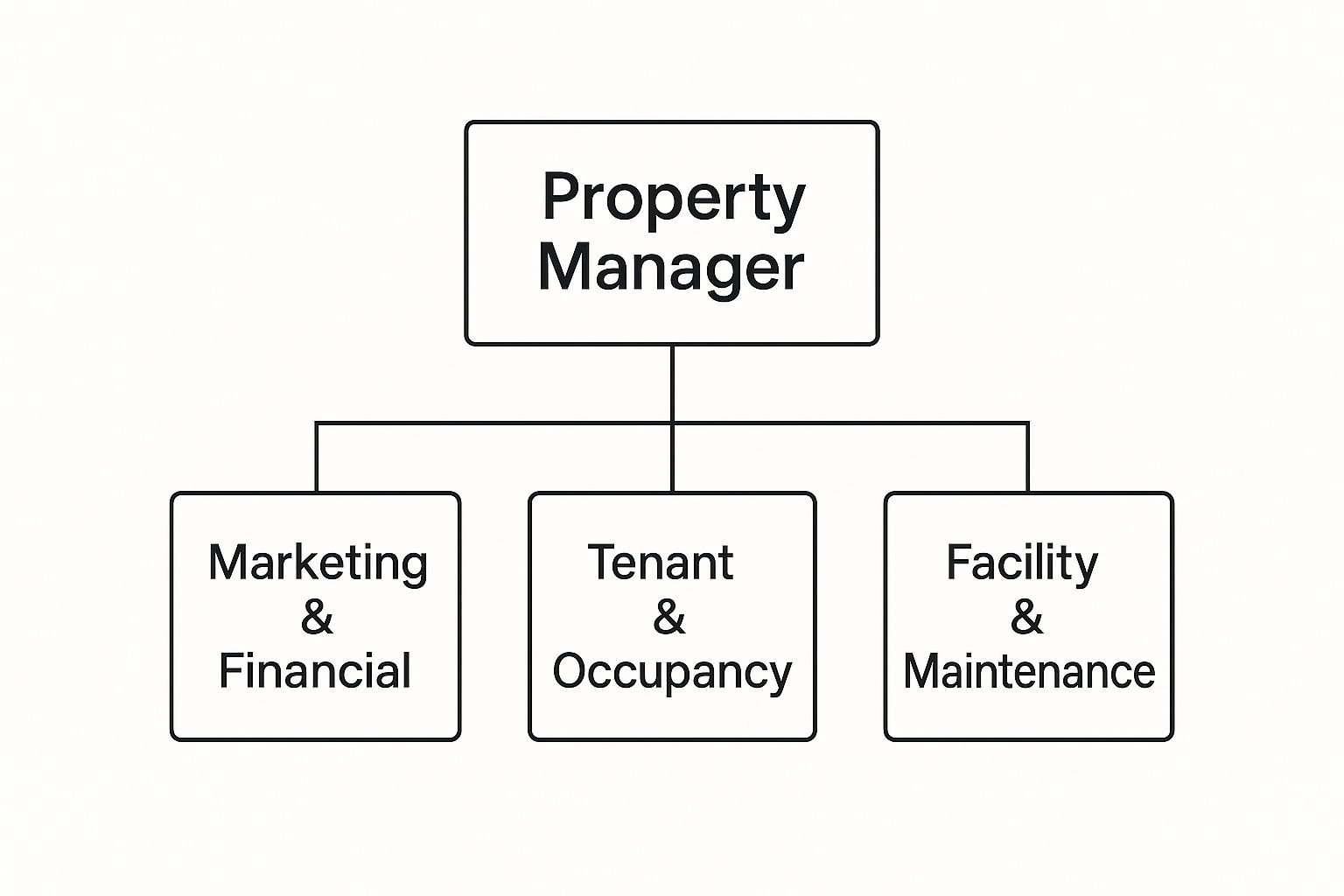How Does Property Management Work? Your Ultimate Guide
- Sarah Porter

- Oct 9, 2025
- 13 min read
So, how does property management actually work? In short, it’s about handing over the day-to-day grind of running a rental property to a professional. This means someone else handles everything from finding great tenants to collecting rent and dealing with maintenance, turning your hands-on job into a much more passive investment.
Think of it this way: your property manager is essentially the COO of your real estate investment.
What Exactly Is Property Management?

Imagine your investment property is a ship. You're the owner, but the property manager is the seasoned captain at the helm, navigating the tricky waters of tenant relations, legal compliance, and market trends. Their job is to manage the property on your behalf, making sure the entire operation runs smoothly and, most importantly, profitably.
For most rental owners, this is a game-changer. It’s the key to transforming an active, often stressful, responsibility into a reliable passive income stream. No more late-night calls about a leaky faucet or awkward conversations about overdue rent. You’re letting an expert handle the headaches.
The Core Value for Property Owners
The biggest payoff of hiring a property manager is simple: you get your time back and a whole lot of peace of mind. A good management company brings experience, proven systems, and a professional touch to the table. This is especially true for owners who:
Just don't have the hours to dedicate to being a full-time landlord.
Live too far away to effectively manage the property themselves.
Would rather not deal directly with tenants.
Want to grow their portfolio without drowning in landlord duties.
This isn't a niche service; it’s a massive industry. The property management market employs around 910,000 people, and the vast majority—a whopping 720,000—are focused specifically on residential properties. If you want to dive deeper, you can explore key property management statistics on DoorLoop.
To give you a clearer picture, here’s a quick breakdown of their main duties.
Core Responsibilities of a Property Manager
Area of Responsibility | Tasks Handled by Property Manager |
|---|---|
Tenant Management | Marketing vacancies, screening applicants, handling leases, and managing tenant communication. |
Financial Oversight | Setting rental rates, collecting rent, managing security deposits, and providing financial reports. |
Maintenance & Repairs | Coordinating routine maintenance, managing emergency repairs, and overseeing property inspections. |
Legal Compliance | Ensuring adherence to landlord-tenant laws, fair housing regulations, and eviction procedures. |
This table just scratches the surface, but it highlights how a manager acts as a central hub for all property-related activities.
By taking on the operational burden, a property manager allows you to focus on the bigger picture—your investment strategy and portfolio growth—rather than the daily grind of being a landlord.
Ultimately, knowing what to expect from a property management company is the first step. Their role is designed to protect your asset, maintain its value, and ensure you get a consistent return on your investment.
The Four Pillars of Property Management
To really get a feel for what a property manager does day-to-day, it helps to break their job down into four core responsibilities. Think of them as the four legs of a table—if one is shaky, the whole thing gets wobbly. A great property manager needs to be an expert in all four areas to keep your investment profitable, protected, and running smoothly.
These aren't just separate tasks; they're interconnected functions that cover the entire lifecycle of a rental property. When they're all handled well, nothing falls through the cracks.
This diagram gives a great snapshot of how these different roles fit together under one umbrella.

As you can see, it's about much more than just collecting rent. It’s a multi-faceted job that demands a wide range of skills.
Marketing and Financial Management
First and foremost, a property manager’s job is to make you money. This pillar is all about maximizing your revenue and keeping the cash flow steady and predictable. It all starts with setting the right rent. A good manager dives deep into local market analysis to find that sweet spot—a price that’s competitive enough to attract tenants quickly but high enough to ensure you're not leaving money on the table.
Once the price is set, they get to work marketing your property. This means getting it listed on all the right websites with great photos and compelling descriptions to build a large pool of qualified applicants. After a tenant moves in, the financial work is far from over. It includes:
Consistent Rent Collection: They have systems in place to make sure rent is paid on time, every single month. No more awkward "Where's the rent?" phone calls.
Paying the Bills: They handle paying property-related expenses on your behalf, like HOA dues, landscaping services, or utility bills.
Clear Financial Reporting: You'll get detailed monthly statements breaking down all the income and expenses. This gives you a crystal-clear picture of how your investment is performing without you having to track every receipt.
Tenant and Occupancy Management
Beyond the numbers, the heart of a rental property is the people living in it. This second pillar is all about managing the human side of the equation, from the first inquiry to the final move-out. Getting this right is the key to minimizing vacancies and avoiding the high costs of tenant turnover.
It starts with a rock-solid tenant screening process. This isn't just a quick credit check; it involves thorough background checks, employment verification, and calls to previous landlords to find reliable people who will treat your property with respect. Once a great tenant is found, the manager handles all the lease paperwork, negotiations, and the move-in process.
One of the biggest perks is that the manager becomes the single point of contact for tenants. They field the late-night calls, handle complaints, and manage maintenance requests. This creates a professional buffer that saves you a ton of time and stress.
When the lease is up, they manage renewal negotiations or, if the tenant is leaving, conduct a detailed move-out inspection to check for damages and handle the security deposit return according to the law.
Facility and Maintenance Management
This pillar is all about protecting your physical asset. A property's value is directly tied to its condition, and proactive maintenance is the name of the game. A manager's job is to catch small issues—like a leaky faucet or a small roof patch—before they turn into massive, expensive disasters.
This is where a manager’s network of contacts becomes invaluable. They have go-to plumbers, electricians, and handymen who are reliable, insured, and often provide better pricing than what you could find on your own. They coordinate everything from routine landscaping to emergency repairs.
This role includes:
Routine Inspections: Periodically walking through the property to spot potential problems and ensure tenants are upholding their lease.
Emergency Response: Being on call 24/7 for true emergencies, like a burst pipe in the middle of the night.
Vendor Coordination: They get the quotes, hire the right people, and make sure the work is done correctly and on budget.
Administration and Risk Management
Last but not least, this is the pillar that keeps you out of trouble. Landlord-tenant law is a minefield of federal, state, and local regulations that are constantly changing. A professional manager makes it their business to stay on top of these laws, protecting you from costly legal mistakes.
This means ensuring your lease is iron-clad and legally compliant, handling security deposits correctly, and, if it ever comes to it, navigating the eviction process by the book. They keep meticulous records of everything—tenant communications, maintenance requests, financial transactions, and inspection reports. This paper trail is your best defense if a dispute ever arises.
Ultimately, this administrative oversight is what shields your investment from the legal and financial risks that can catch even the most well-intentioned DIY landlords off guard.
Decoding Property Management Fees

Let's talk about the money side of things. Before you hand over the keys, it's critical to understand exactly how a property management company gets paid. Getting this right from the start helps you accurately forecast your investment's real-world returns and avoids any nasty financial surprises later on.
The most common way property managers charge for their services is the percentage-based fee. This is pretty simple: they take a cut of the monthly rent they collect for you, which typically lands somewhere between 8% and 12%.
So, if your property rents for $2,000 a month and the manager’s fee is 10%, you’ll pay them $200 for that month. The beauty of this model is that your manager's success is tied directly to yours. If you don't get paid, they don't either, which keeps everyone motivated to find and keep good, paying tenants.
Common Fee Structures
Of course, that's not the only way it's done. Some companies prefer a flat-fee model. With this setup, you pay a fixed dollar amount every single month, no matter what the rent is. This can be a great deal for owners with higher-end properties, as it locks in a predictable expense.
No matter which model a company uses, you need to be crystal clear on what that monthly fee actually covers. Usually, it’s for the core, day-to-day work: collecting rent, handling tenant calls, and sending you financial statements. But what about everything else?
The monthly management fee is just one piece of the puzzle. Most management agreements include other charges for specific services, and knowing what they are is essential for budgeting accurately.
These extra fees typically pop up for one-off tasks that aren't part of the regular monthly grind.
Other Potential Costs to Expect
Think of these as "à la carte" services. They only apply when certain events happen during the rental cycle, but they're important to have on your radar.
Tenant Placement Fee: This is a one-time fee for the heavy lifting of finding a new tenant. It covers marketing the vacancy, showing the property, and thoroughly screening applicants. Expect this to be around one month's rent.
Lease Renewal Fee: When a great tenant decides to stay, there's still paperwork involved. Some managers charge a small, flat fee to handle the negotiation and drafting of the new lease.
Maintenance Coordination Fee: You’ll always pay the plumber's or electrician's bill directly, but some companies add a small surcharge (often around 10%) to the invoice. This covers their time spent scheduling, coordinating, and overseeing the repair work.
The property management industry is a massive global player. To give you some perspective, the European market alone accounts for over 30% of worldwide revenue, hitting a market size of USD 8.07 billion. Powerhouses like Germany (USD 1.60 billion) and the UK (USD 1.36 billion) really highlight the scale of this business, as detailed in these property management market findings on Cognitive Market Research.
The bottom line is simple: read your management agreement from top to bottom. Every potential fee should be clearly spelled out. For an even deeper dive, be sure to check out our complete guide to property management fee structures.
How to Hire the Right Property Manager
Think of hiring a property manager as hiring a CEO for your real estate business. It’s a huge decision. The right partner can boost your profits and give you total peace of mind, but the wrong one can quickly turn your investment into a constant headache.
The first step is simply finding good candidates. The best place to start is often your own network—ask local real estate agents, other investors, or even your accountant for recommendations. You can also check out online directories from professional organizations like the National Association of Residential Property Managers (NARPM) to find credentialed pros in your area.
Once you’ve got a short list, it’s time to interview. This is your chance to really tell the experts from the amateurs. You need to get a feel for their experience, their communication style, and exactly how they run their business before you even think about signing a contract.
Vetting Your Potential Partner
Treat this process like a job interview, because that’s what it is. You’re about to hand over a massive asset to this person or company, so don't be shy about digging deep. The cost is important, but their day-to-day operational skills are what will truly make or break your investment.
You need to ask sharp, specific questions about their entire process:
Tenant Screening: What are your exact criteria for a qualified tenant? Walk me through your background and credit check process.
Maintenance Protocol: How do you handle a leaky faucet versus a burst pipe at 2 AM? Do you have a trusted network of insured and licensed vendors?
Financial Reporting: What do your monthly owner statements look like? Can I see a sample so I know what to expect?
Local Market Knowledge: How do you land on the perfect rental price for my specific property and this neighborhood?
For a full checklist to bring with you to your meetings, check out our guide on 8 key questions to ask property managers in 2025.
Reviewing the Management Agreement
The last hurdle is reviewing the property management agreement. This legal contract is the foundation of your entire relationship, spelling out every single responsibility, fee, and expectation.
Pay close attention to the fine print. Key clauses to look for include the termination policy, fee transparency, and the exact scope of their authority to approve expenses without your direct consent.
A good agreement is designed to protect both you and the manager. It should clearly define the services included, all the costs, and how any disagreements will be handled. A manager who values your business will gladly take the time to walk you through the entire document, answering every question you have. This final step ensures you’re kicking off a strong, successful partnership from the very beginning.
The Real Benefits of Professional Management

It’s one thing to understand the what and how of property management, but it's another thing entirely to see what it can do for your bank account and your sanity. Bringing in a professional is about more than just having someone collect rent—it’s about fundamentally changing your property from a demanding second job into a truly passive, high-performing asset.
This isn’t just a niche service anymore. The global property management market is booming, growing by 3.05% last year alone. It’s on track to more than double from USD 24.01 billion to a staggering USD 52.99 billion by 2033, and a lot of that growth comes down to smarter systems and technology. If you're curious about the numbers, you can discover more insights about the property management market on startus-insights.com.
Maximizing Profit and Minimizing Hassle
So, where do you see the payoff first? It almost always starts with better tenants. A good property manager has a rigorous, tried-and-true screening process that goes deep—we're talking background checks, credit reports, and actually calling previous landlords. This alone weeds out applicants who are likely to cause problems, which means more consistent rent payments and less wear-and-tear on your property.
They also know how to keep your property from sitting empty. Vacancies are profit killers. A professional manager uses sharp marketing and quick follow-up to get a flood of applicants in the door, filling your unit fast. Once they have a great tenant, their expertise in keeping them happy means fewer costly turnovers down the line.
The ultimate benefit is turning a variable, often stressful, income source into a predictable one. A manager smooths out the operational bumps, allowing you to enjoy the financial rewards without the daily grind.
Protecting Your Investment and Your Time
Beyond the money, a good manager acts as your first line of defense. Landlord-tenant law is a minefield of local, state, and federal regulations. One wrong move, even with the best intentions, can lead to a lawsuit. An expert keeps you compliant and shields you from that kind of liability. It’s a huge weight off your shoulders.
Here’s where you’ll really feel the difference in your day-to-day life:
Cost Savings on Maintenance: Managers work with the same trusted plumbers, electricians, and handymen day in and day out. They have vetted networks of insured pros and can often get work done for much less than you could on your own.
Time Freedom: The late-night calls about a broken water heater? The back-and-forth scheduling repairs? The awkward conversations about late rent? That's their job now, not yours. Your time is freed up for your family, your career, or scouting your next property.
Reduced Stress: There's an incredible peace of mind that comes from knowing a professional is handling everything. They become the buffer between you and any problem that could possibly arise.
At the end of the day, a great property manager doesn't just manage a building. They manage your investment to squeeze every last drop of performance out of it while protecting its value for the long haul.
Common Questions About Property Management
Alright, so you've seen what a property manager does and how they can help. But now we get to the brass tacks—the practical, real-world questions that pop up when you're seriously considering handing over the keys to your investment.
These are the questions that take you from "How does this all work?" to "How will this work for me and my property?" Getting straight answers is the only way to feel confident about delegating such a huge asset. Let's dive in.
How Much Control Do I Keep Over My Property?
This is usually the first and biggest concern for owners: Am I going to lose control? The short answer is no. You're still the boss. You own the property, and the management agreement is there to delegate tasks, not sign away your rights.
Think of your property manager as the COO of your rental business, while you remain the CEO. They handle the day-to-day grind, but they operate within a framework you both agree on.
You hang onto full ownership and strategic control. The management agreement spells out exactly what the manager can do on their own for daily tasks, but you always have the final say on the big stuff—like approving new tenants, setting the rent, or authorizing major repairs.
For example, it's standard to set an approval limit for maintenance. You might say, "Anything over $500 needs my direct sign-off." This keeps you in the loop on key financial decisions without getting pestered every time a toilet needs a new flapper.
What Happens When a Tenant Must Be Evicted?
Let's be honest: eviction is the single most dreaded part of being a landlord. It's stressful, legally tricky, and just plain unpleasant. This is where a professional manager earns their keep and then some, offering true peace of mind.
They start by serving all the legally required notices, following state and local laws to the letter. This is a minefield where DIY landlords often make expensive mistakes, but a pro knows the exact forms and deadlines.
If the tenant doesn't comply after being notified, the manager takes over completely. They will:
File the right paperwork with the court to get the formal eviction process started.
Represent you in court hearings or bring in legal counsel on your behalf.
Work with law enforcement to legally and safely regain possession of your property.
Their experience ensures the whole ordeal is handled correctly and efficiently. More importantly, it's handled legally, protecting you from wrongful eviction lawsuits, fines, and the emotional toll of dealing with a difficult tenant situation yourself.
Can a Property Manager Actually Increase My Profit?
Yes, absolutely. It seems counterintuitive—how can paying someone more money make you more money? But a great property manager often boosts your net income so much that their fee becomes a fantastic investment. They do this by both maximizing revenue and cutting costs.
First off, they'll perform a detailed market analysis to nail down the perfect rent price. You want it high enough to maximize your income, but not so high that the property sits empty for months. This isn't guesswork; it's data-driven. Getting the rent right from day one prevents you from leaving money on the table year after year.
On top of that, they boost your bottom line by:
Slashing Vacancy Time: Their marketing machine gets your property in front of more qualified renters, and they're quick to respond to inquiries and show the unit. Less downtime means more rent checks in your pocket.
Improving Tenant Retention: Good managers are experts at finding great, long-term tenants. By keeping them happy with professional service, you avoid the high costs of turnover—like lost rent, cleaning, and repairs.
Lowering Maintenance Costs: They have a go-to list of trusted, reliable contractors who often give them better rates than the general public gets.
When you combine higher rental income with lower vacancy and maintenance costs, your profitability goes up. It’s a strategic approach that turns your property into a much more efficient and lucrative investment.
At Keshman Property Management, we get it—your property is one of your biggest assets. We’ve been landlords ourselves for over 20 years, so we know what it takes. We provide the expertise and hands-on attention you need to make owning a rental less of a headache and more of a reward. Learn more about our transparent, owner-focused services at https://mypropertymanaged.com.

Comments